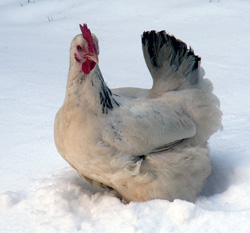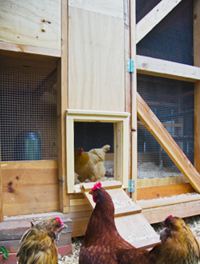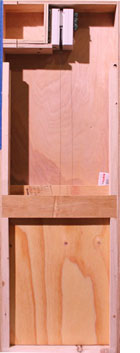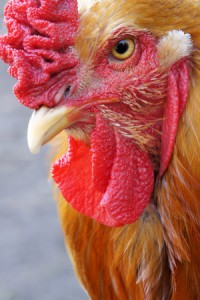I’ve been thinking about plans for chicken coops and keeping the ladies warm in the winter. Last year it got really cold just before Christmas and although I know chickens are tough old birds, I wouldn’t want them freezing their little feathers off!
 I know, it’s only late June, but you need to plan ahead right? Well anyway, it was on my mind so there you are. You can always come back and read this again when the frosts arrive 😉
I know, it’s only late June, but you need to plan ahead right? Well anyway, it was on my mind so there you are. You can always come back and read this again when the frosts arrive 😉
Most of the designs for chicken coops I’ve seen are pretty good. The free chicken coop plans usually leave something to be desired (not surprisingly as they probably couldn’t put the time and detail in that a professional can) but nobody really gets into heating or insulation.
So I had a bit of a search around, as you do. I was initially looking for chicken coop heaters. There are plenty around. Some are ceramic things you plug in like a light bulb – apparently a lot of reptile keepers use them. They can get very hot – like 200+ degrees F. I’m not sure that wouldn’t be a fire risk. Then I found some heated panels – which look great, and safe, but they need to be plugged in and they start at over 50 bucks (if you know of cheaper ones, please let me know).
So then I thought about insulation, and found some great advice over at Chicken Keeping Secrets. It boils down to this:
Like I said before, chickens can take it pretty rough. In either hot or cold conditions they will do OK so long as they have water. That’s not to say they’ll be fine in all conditions, but minus a couple of degrees won’t harm them – they’ll just all cuddle up together for warmth.
If you want to give them some heat, they’ll probably be happier for it – but it probably won’t change the number of eggs they lay in winter – which is more effected by how light the days are than by heat.
If you want to insulate, that can also be a good idea but it’s really important to seal all the insulation in – because chickens will attempt to eat more or less anything. Now I like chickens, but they aren’t the smartest creature ever. They’ll peck at fiberglass, rockwool, or whatever you use – and won’t be able to tell if it’s toxic so they can do themselves a lot of harm.
The other reason to make sure that insulation is well sealed in is parasites. All kinds of bugs will live in it if they can. Some your hens will eat but others, like fleas and ticks, can make your ladies very uncomfortable.
I thought it was a really useful piece, and there’s plenty more great chicken keeping advice so I’ll certainly be keeping Chicken Keeping Secrets on my favorites list.



 Hi there, welcome to Best Plans For Chicken Coops!
Hi there, welcome to Best Plans For Chicken Coops!